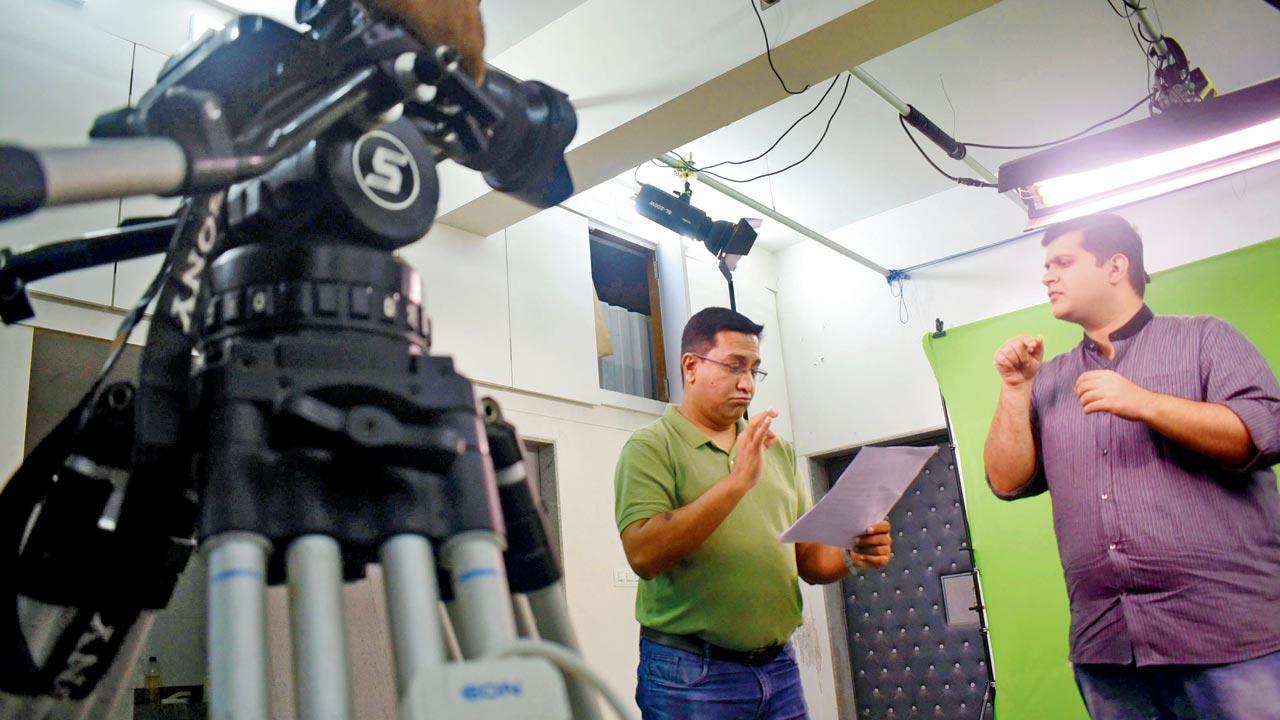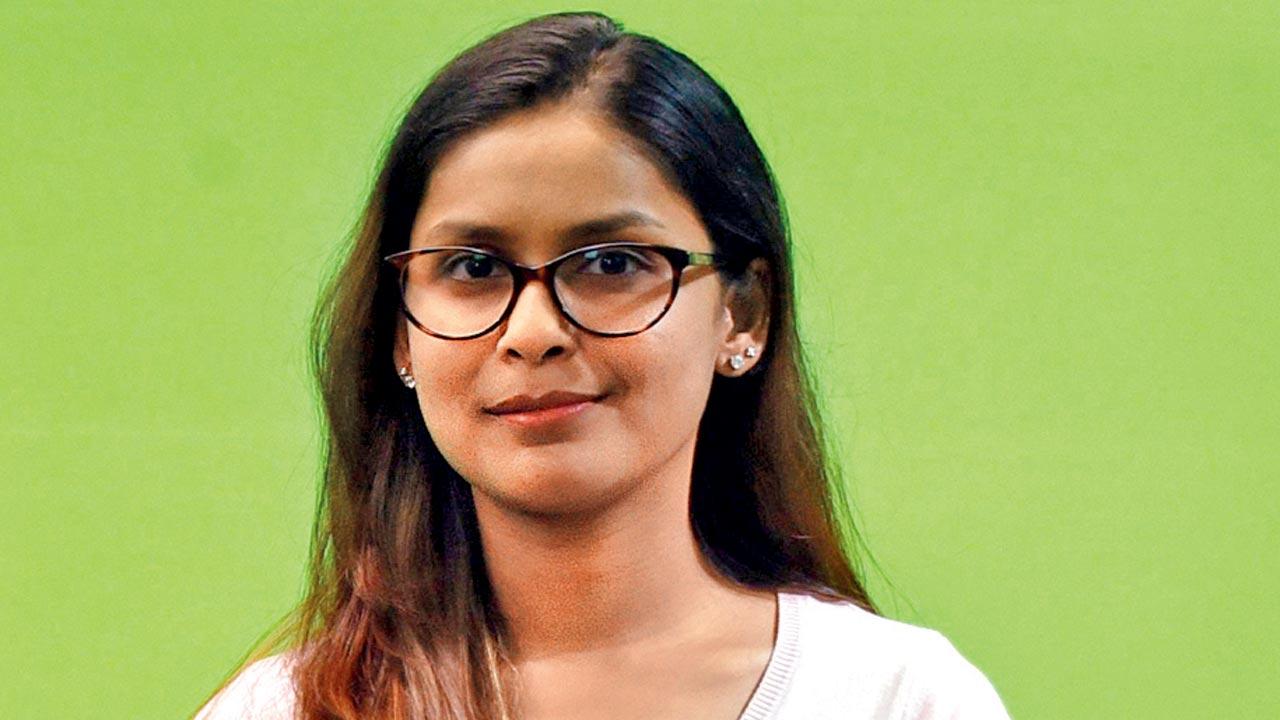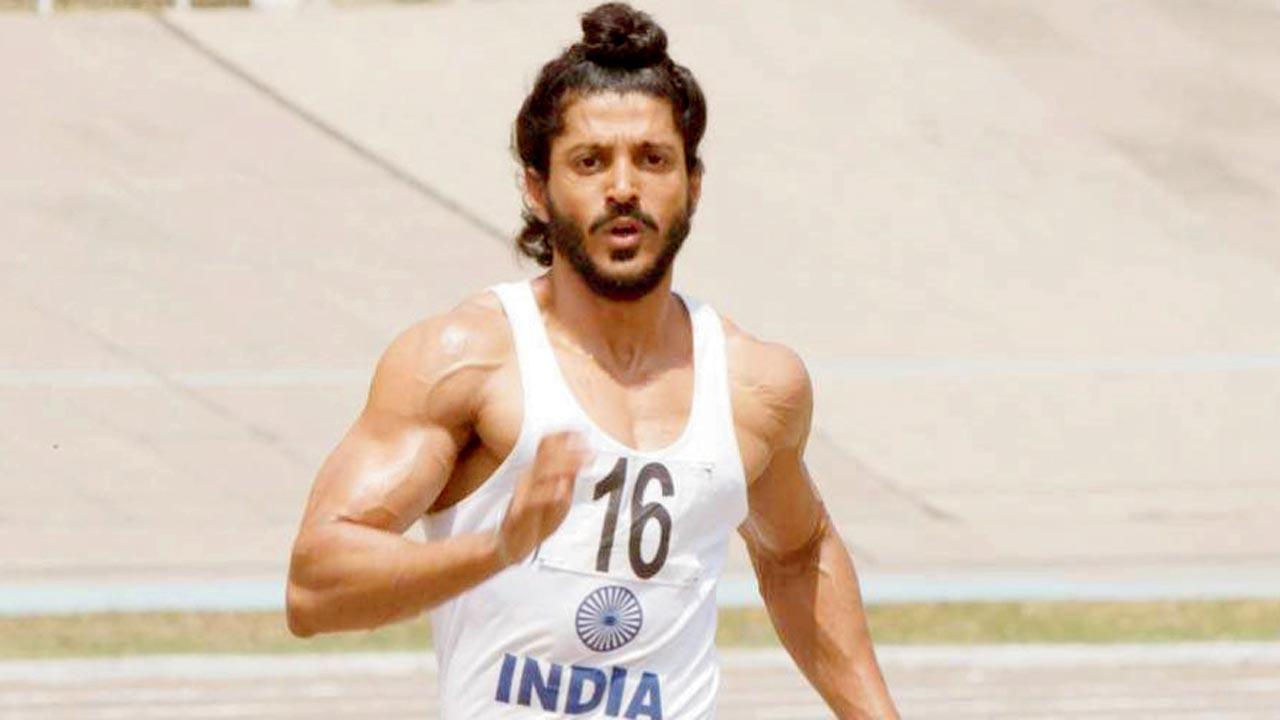By re-releasing popular films with sign language interpretations, a Lower Parel based organisation is filling up seats for inclusivity in the mainstream

Aqil Chinoy discusses the next sign language news bulletin to be broadcast by India Signing Hands, which has been pushing the boundaries of inclusivity for the deaf community. Pics/Sameer Markande
Earlier this month, the Farhan Akhtar-starrer Bhaag Milkha Bhaag was released in theatres again, 10 years after its original release but with one addition: On the bottom right of the screen, all through the movie, an interpreter relayed shot-by-shot in sign language. She looked stricken when Milkha Singh said, “Sir mujhse nahi hoga (Sir I can’t do it)” and was lovestruck when he proposed to his lady love. She even danced while interpreting the lyrics to the songs.
ADVERTISEMENT
Every person who watched the film, which was re-released specifically for deaf audiences, came out with a smile on their face. They all had the same thing to say, “This was the first time we truly enjoyed a film because we understood everything. Finally, we watched a movie in our language.”
Bhaag Milkha Bhaag was the third film re-released with interpreters. The brainchild of India Signing Hands (ISH), a Lower Parel-based organisation working towards better inclusivity for the deaf, the idea was a learning experience for its co-founders. It showed how much more work needed to be done for the deaf community to be included in mainstream life.
 Chinoy was born to deaf parents, and has a deaf aunt, uncle and younger brother
Chinoy was born to deaf parents, and has a deaf aunt, uncle and younger brother
“The one question we were asked,” says Aqil Chinoy, one of the three founders, “is whether it’s a good idea to have an interpreter at the bottom right of the screen. People thought it could distract the audience from the film. What they don’t realise is that because our one sense is under-developed or lacking, all other senses sharpen automatically over time. A deaf person can take in what’s happening on the entire screen, the film and the interpreter, at the same time, simply because our peripheral vision is very strong.”
Born and raised in a deaf family—parents, uncle, aunt and younger brother included—this never dampened the spirits of the Chinoys. “We are never bothered by the screaming and arguing of neighbours,” says Chinoy. “We can sleep peacefully no matter how many vehicles are honking outside our house. And my father, who is a technology fan, has installed lights all over the house that indicate the doorbell has rung, or the front gate has been left open, that the telephone is ringing… There are lights outside every room, including the bathroom. As we can’t call out to its occupants, we just press a switch. And we sleep with vibrating alarm clocks under our pillows.”
Chinoy’s entire life has been a constant battle with misconceptions and ignorance. At school—this was at a time when most deaf schools in India relied on lip reading—his teachers warned Chinoy’s parents against using sign language with him at home. The common misconception, which prevails despite repeated research indicating otherwise, is that sign language diminishes perception and logical thinking.
 Priya Sundaram
Priya Sundaram
After completing Class III, he was integrated into a mainstream school upon his principal’s recommendation and struggled with lip-reading up to Class X. His parents then sent him to Gallaudet University in Washington DC, the world’s only institution for deaf and hard of hearing individuals that teaches American Sign Language and English. The education he received there, coupled with the experiences of his childhood, set the foundation for his life’s work.
After working with a private firm for 15 years, he co-founded India Signing Hands with businessman Alok Kejriwal, who is deaf, and Dr Mansi Shah, a hearing child of deaf parents. While they started with promoting sign language, they soon realised that there was a lot more to done. From here, the idea of relaying the daily news in sign language was born.
“In my childhood, my family was deprived of knowledge and information from TV channels as they used spoken language,” he says. “I realised that due to this lack of accessibility, many deaf individuals face difficulties, especially with education and employment. I concluded that the first step had to be towards quality education and access to information.”
 The re-released version of Bhaag Milkha Bhaag had an interpreter at the bottom right of the screen, narrating the entire film in sign language
The re-released version of Bhaag Milkha Bhaag had an interpreter at the bottom right of the screen, narrating the entire film in sign language
Launched in 2018, ISH News, streaming on Instagram (ishnews) as well as YouTube, became a runaway hit for more than one reason. The news broadcasts have video, subtitles, an interpreter relaying it in sign language and even audio, which helps others learn sign language as well.
“Many ask why we need an interpreter when there are subtitles,” says Chinoy, “What nobody thinks about is that because of the lack of resources for them, the deaf don’t get access to quality education and hence, a large number of them can’t read subtitles.”
The whole idea to make movies accessible is based on the simple premise: Why shouldn’t the deaf be able to enjoy movies? In a world that thinks about inclusion in terms of employment and equal rights, entertainment and recreation take a backseat. But those, too, are the basic rights of any human being.
“I was never able to enjoy films because the subtitles just didn’t work for me,” says Chinoy. “I always wanted the deaf to be able to enjoy them. Besides, by drawing them to the cinema halls, what else are filmmakers doing other than promoting inclusivity?”
ISL first interpreted The Kashmir Files in 2022, and then 83 in the same year. The response was tremendous—apart from heart-warming reactions from the deaf community, it also marked the beginning of enlisting top celebrities to the cause. “Thousands of deaf people reached out with appreciation and gratitude, and expressed how they were able to fully connect with the movie, thanks to the sign language interpretation.
mid-day visited the ISH office-studio in Lower Parel, a cocoon of peace in the busy industrial estate. ISH shoots and edits all its news videos here, while two teachers conduct sign language classes in a corner. Chinoy conversed with this writer through his interpreter, Priya Sundaram. The synergy between them is obvious, with Sundaram not only translating his signs into words but also mirroring his emotions. Her voice rises and falls with the words, as if it were him speaking.
Point this out to her, and she doesn’t even think it’s surprising or out of the ordinary. “That’s how sign language works. It is more than hand gestures, it has its own grammar,” says Sundaram, who is a CODA (Children of Deaf Adults). Her mother is deaf, while her father is hearing. She grew up learning two languages and started working with ISL four years ago, part time. “I came here with the intention of working a few hours a day, and never left,” she says.
 Subscribe today by clicking the link and stay updated with the latest news!" Click here!
Subscribe today by clicking the link and stay updated with the latest news!" Click here!







